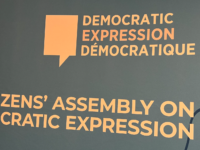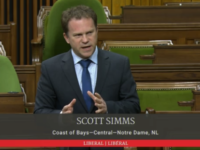The Canadian Parliament is set to resume this week and it’s a safe bet that Internet regulation will be part of the legislative agenda in the coming months. One of the toughest policy issues involve misinformation, which can be difficult to define and potentially to regulate. The Canadian Commission on Democratic Expression was established in spring 2020 with a three-year mandate to better understand, anticipate, and respond to the effects of new digital technologies on public life and Canadian democracy. As part of its work, it created a Citizens’ Assembly comprised of Canadians from across the country who recently gathered for several days to debate disinformation online. Last week, I was honoured to deliver a dinner speech to the group followed by a facilitated discussion. This week’s podcast features a recording of that lecture with the slides posted here.
 Articles by: Michael Geist
Articles by: Michael Geist
The Law Bytes Podcast, Episode 108: Scott Benzie on How Bill C-10 Ignored Canada’s Thriving Digital First Creators
The Canadian digital first creator economy isn’t something that politicians or policy makers seem to know much about, but they are quick to propose legislative reforms that directly implicate it, most recently in the form of Bill C-10. Yet the sector is thriving, with Canadian stars earning millions of dollars and attracting global audiences that often exceed Canada’s conventional film and television sector.
Scott Benzie, the CEO of Buffer Festival, started in traditional media but now advocates and works with creators, platforms and industry around online content. He joins me on the podcast to discuss the current state of digital first creators in Canada, their omission from the Bill C-10 process, and the formation of Digital First Canada, a new advocacy group to better represent the needs of the community.
The Law Bytes Podcast, Episode 107: Addison Cameron-Huff on the State of Crypto and Blockchain Regulation in Canada
From Bitcoin to NFTs, interest in crypto and the blockchain has never been greater. Millions of people around the world invest in various crypto currencies, exchanges seem to pop-up daily, and for better or worse the pace of innovation and new services is reminiscent of the early of the days of the Internet. As the industry races ahead, where does the law fit in? Can the law fit in?
Addison Cameron-Huff is a Toronto-based blockchain and cryptocurrency lawyer. A former president of Decentral, a leading Canadian blockchain company and the co-founder of Toronto Blockchain Week, his clients have included virtual currency dealers, DeFI platforms, and stablecoin developers. He joins the Law Bytes podcast to provide some insight into the state of Canadian law and regulation when it comes to this fast-moving, globally oriented sector.
The Law Bytes Podcast, Episode 106: Former Canadian Heritage Committee Chair Scott Simms Goes Behind the Scenes of the Bill C-10 Hearing
Scott Simms, a Liberal MP from Newfoundland for 17 years, was long recognized as a leading voice on Parliament Hill on cultural and digital policy. Simms recently served as the chair of the Standing Committee on Canadian Heritage, which conducted the review of Bill C-10 and which placed him at the heart of one of the year’s more controversial pieces of proposed legislation. Simms was not re-elected this past fall and is now well positioned to reflect on policy making in Canada and the issues that arose with Bill C-10. He joins the Law Bytes podcast for a conversation about the bill, his suggestions for how the process can be improved, and his thoughts on the challenges of crafting forward-looking digital policies.
The Law Bytes Podcast, Episode 105: NDP MP Charlie Angus on Canada’s Failed Digital Policy and His Hopes for the Next Parliamentary Session
NDP MP Charlie Angus has been a consistent – and persistent – voice on digital policies since his election to the House of Commons in 2004. He was one of the first MPs to seriously consider user rights within Canadian copyright law, a vocal supporter of net neutrality and more affordable wireless services, and a leading advocate for privacy protection and social media regulation.
Last week, Angus called a press conference to unveil his six point plan for digital policy, which emphasized accountability, privacy reform, and algorithmic transparency. Along the way, he derided the government’s Bill C-10 efforts as a political dumpster fire and voiced support for the creation of a new officer of parliament charged with responsibility for social media regulation. Charlie Angus joins the Law Bytes podcast this week to reflect on the failed bill C-10 and C-11, his concerns with the online harms consultation, and his hopes for the coming parliamentary session.











